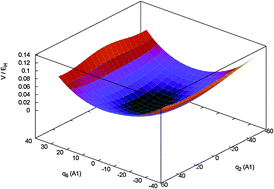Modeling of high-order terms in potential energy surface expansions using the reference-geometry Harris–Foulkes method
Abstract
The reference-geometry Harris–Foulkes (RGHF) approach has been used to model high-order terms within the expansion of multi-dimensional potential energy surfaces (

- This article is part of the themed collection: Spectroscopy and dynamics of medium-sized molecules and clusters

 Please wait while we load your content...
Please wait while we load your content...